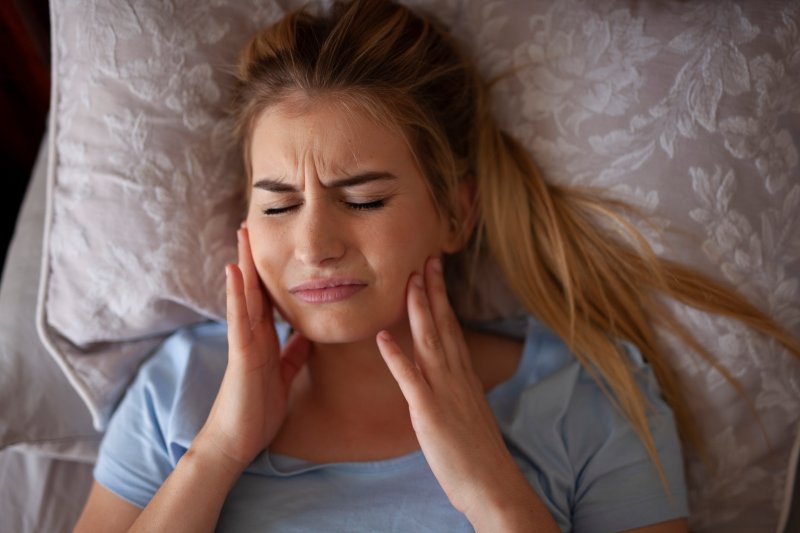Your Untreated TMJ Disorder Might Be Affecting Your Sleep
April 1, 2022

Sleeping disorders are an epidemic—over 40 million Americans suffer annually from chronic sleeping issues, and another 20 million experience occasional sleeping problems. If you fall into one of these categories, then you probably know exactly just how debilitating this can be—you aren’t yourself when you don’t get enough sleep! But did you know that many people with sleeping disorders are simultaneously afflicted with problems in their TMJ? Here’s what you need to know about how untreated TMJ dysfunction can cause sleeping conditions.
The Importance of a Healthy TMJ
Your TMJ (temporomandibular joint) is one of the most important joints in your whole body; it attaches your lower jaw to the temporal bone of your head, and when functioning properly, allows you to chew, swallow, and yawn with relative ease and no pain. But when it isn’t working correctly, many problems can arise—TMJ disorders can cause a lot of pain and discomfort in other parts of the body. Some symptoms include sleep apnea, teeth grinding, and tension headaches or migraines; all of which can impact your quality of sleep!
Can TMJ Disorders Cause Sleeping Conditions?
There are a few sleeping conditions that are directly related to TMJ disorders, with a common one being sleep apnea. Sufferers have trouble breathing as they sleep due to an obstructed airflow, and their body must continually wake up to normalize their breathing cycle. In many sleep apnea cases, a misaligned jaw joint is to blame.
Bruxism, or teeth grinding, is also caused by jaw misalignment and makes you unconsciously clench your teeth together—this can cause significant damage to them as you sleep! Severe bruxism can lead to further complications like lockjaw and tension headaches. Since it affects the alignment of your bite, bruxism also influences the integrity of your upper airway—worsening the effects of obstructive sleep apnea.
Signs That You Might Have TMD
Research estimates that over 44 million Americans have one of the several variants of TMJ disorder, also known as TMD. Women are more prone than men, and pain when chewing is the most common symptom. Other warning signs include:
- Limited movement or a locking sensation in the jaw
- Ringing in the ears
- Clicking or popping of the jaw joint
Many of these symptoms are the result of muscle tension and misalignment in the jaw—persistent symptoms can lead to chronic problems, so visit your dentist if you’re not noticing any improvement after a few days. The sooner you get to the bottom of what’s causing your TMJ disorder, the less likely you’ll develop a condition that inhibits your sleep.
TMJ pain can really bring you down—and if it’s inhibiting your ability to sleep, it’s time to see your dentist. The connection between your jaw and getting a good night’s sleep is too important to neglect.
About the Author
Dr. Eric Coontz completed his dental doctorate at the Loyola University School of Dentistry in Chicago and has served patients in the Albuquerque area for several years. He is a member of several professional organizations including the American Academy of Sleep Medicine, the American Sleep and Breathing Academy (Diplomate status), and the Academy of Associate Sleep Professionals, among others. His practice offers a wide range of services including sleep apnea treatment and TMJ therapy, and he would be happy to assist you with any questions you have. You can schedule an appointment with Dr. Coontz through his website or by telephone: (505) 433-2107.
No Comments
No comments yet.
RSS feed for comments on this post.
Sorry, the comment form is closed at this time.
